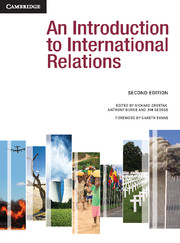Book contents
- Frontmatter
- Contents
- Tables, Figures and Boxes
- Contributors
- Preface and acknowledgements
- An Introduction to International Relations: The origins and changing agendas of a discipline
- 1 Theories of International Relations
- 2 The Traditional Agenda
- 9 The Modern State
- 10 Nations and Nationalism
- 11 Security
- 12 Arms Control
- 13 The Causes of War
- 14 The Changing Character of Warfare
- 15 The Ethics and Laws of War
- 16 International Law
- 17 International Society and European Expansion
- 18 Diplomacy
- 19 Great Powers
- 20 The Cold War
- 3 The New Agenda
- Glossary of Terms
- Bibliography
- Index
- References
11 - Security
from 2 - The Traditional Agenda
- Frontmatter
- Contents
- Tables, Figures and Boxes
- Contributors
- Preface and acknowledgements
- An Introduction to International Relations: The origins and changing agendas of a discipline
- 1 Theories of International Relations
- 2 The Traditional Agenda
- 9 The Modern State
- 10 Nations and Nationalism
- 11 Security
- 12 Arms Control
- 13 The Causes of War
- 14 The Changing Character of Warfare
- 15 The Ethics and Laws of War
- 16 International Law
- 17 International Society and European Expansion
- 18 Diplomacy
- 19 Great Powers
- 20 The Cold War
- 3 The New Agenda
- Glossary of Terms
- Bibliography
- Index
- References
Summary
Introduction
This chapter introduces the concept and practice of security in international relations. It explores the dilemmas faced by states, individuals and the global community by, first, looking at contemporary crises and disagreements about security; second, examining how security has been differently defined and focused; and third, surveying how different theoretical approaches have understood and analysed security.
Four crises
In October 1962 a US U-2 reconnaissance aircraft returned from a routine overflight of Cuba with photographs of Soviet personnel and machinery installing nuclear missiles aimed at the US – precipitating a crisis that almost led to global nuclear war (Blight and Lang 2005). In July 1997 the government of Thailand floated its currency, the baht, on international markets after losing US$23 billion trying to defend its value from attack by traders. It lost 15 per cent of its value in one day, provoking a contagion effect across East Asia that resulted in widespread corporate bankruptcies, massive falls in economic growth and employment, the fall of governments, and protests, riots and civil violence that took thousands of lives (Robison, Beeson et al. 2000).
- Type
- Chapter
- Information
- An Introduction to International Relations , pp. 160 - 171Publisher: Cambridge University PressPrint publication year: 2011



